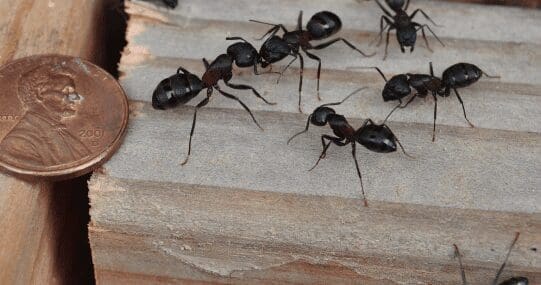
Bee Relocation & Removal
Safely remove honey bees with relocation and pesticide-free solutions.
Bee Removal Services
Safely remove bees from your property with our professional bee relocation services.
What’s that buzzing sound? And where is it coming from? If it’s springtime in Oregon, what you’re hearing is probably the sound of bees on the move. Don’t be alarmed! While wasps and hornets can be more aggressive, bees are actually amazing creatures that provide a variety of benefits to humanity. They’re also critical agents for agricultural food production and the survival of our environment. But when they’re nesting in or around your home it’s hard to appreciate nature’s little wonders. Safely remove a beehive on your property with Bug Zapper’s bee relocation services.
At Bug Zapper, we love and recognize the importance of bees – and it’s our goal to protect these creatures and try to keep them safe from harmful pesticide exposure. Wherever possible, we seek to relocate bee colonies and beehives to ensure their survival. When it is a necessity for your family’s safety, we provide emergency bee management services for destructive or aggressive hives and can help you determine the best course of action. Our skilled technicians will assess and identify your specific bee problem, and apply a personalized solution that will also ensure a re-infestation is prevented. Our team of experts is standing by to give you the industry expertise, efficiency, and incredible customer care that Bug Zapper is known for, along with our 100% satisfaction guarantee. If you need a solution for bee-free living, give us a call today!
Call
24/7
Customer Care and Pricing
Get Help From Our Experts
Honey Bee Relocation Pricing
All pricing for Honey Bee relocation and removal is determined by inspection and
consultation. To learn more about this service and pricing, please contact us.
All Bugs Package
Ants, spiders, general pests, stingers, carpet beetles, interior and exterior fleas & ticks, and general pests.
- Service Starting At:
- $49
*Excludes: termites, mosquitoes & wood destroying insects.


Add Rodent Protection
Only $20/mo
 Bug Barrier Treatments
Bug Barrier Treatments Best Plan for Pets
Best Plan for Pets No Bugs. Period.
No Bugs. Period. Love it. Guarantee!
Love it. Guarantee! Unlimited Free Retreatments
Unlimited Free Retreatments
No Bugs. Period.
With our All Bugs Package, we guarantee you won’t have any creepy, crawly, biting, or stinging bugs on or in your home.
 No ants, no spiders, no fleas, no bedbugs, no cockroaches…NO bugs.
No ants, no spiders, no fleas, no bedbugs, no cockroaches…NO bugs.
How it works:
 We set up and maintain a Bug Barrier around your home.
We set up and maintain a Bug Barrier around your home. If a bug tries to cross that line, text us and we’ll take care of it faster than you can believe. It’s our No Bugs Guarantee.
If a bug tries to cross that line, text us and we’ll take care of it faster than you can believe. It’s our No Bugs Guarantee.
Basically, if you ever want to see bugs, you’ll have to go camping!
BUG ZAPPER’S PROMISE:
NO PESTS  Period
Period
With years of experience, continued education, and our expertise, we provide the best service and customer experience.

Honey Bee Control FAQs
Choosing an ant control service for your home comes with many questions. When you’re ready to
learn more, call our office and talk with our friendly staff. We’ll ensure you get the answers you need
on our services, pricing, appointments and any other questions you may have.
What are bees?
Bees are a group of hairy, winged insects closely related to wasps and ants. They are found on every continent in the world except for Antarctica and are known for their important ecological function as pollinators (with the hair on their bodies used to collect and transport pollen). Some species, such as the western honey bee, are also known for their production of honey. While we commonly think of bees as social creatures living in large hives, more than 90% of bee species live solitarily. Honey bees and bumblebees, two of the most commonly recognized varieties of bees, live in social colonies and construct large hives.
There are roughly 20,000 known species of bee, with 4000 of those native to the United States. Bees are commonly identified by their yellow and black stripes, though some types of bees don’t bear these characteristics. Additionally, bees are frequently confused for wasps or hornets, and vice-versa. Though bees and wasps are capable of stinging, most varieties of bees are only aggressive when sufficiently provoked (such as in an attempt to destroy their home). Only female bees possess stingers, and honey bees die upon delivering a sting.
Why are bees important?
Bees are frequently grouped with their cousins, ants, and wasps, as a nuisance. However, bees serve a crucial ecological function and are required for the pollination of crops and flowering plants. Over 35% of all food in the world is directly dependent on bees, with over 90% of the world’s top 107 crops being visited by bees. In addition to being required for crop survival, natural habitat stability, and ecological biodiversity, bees also produce the materials necessary for a wide variety of important products. Honey is used as a sweetener, baking ingredient, and skincare component, but is also recognized by modern medicine for its antimicrobial, antioxidant, anti-inflammatory, and anti-cancer properties. Beeswax is widely used in skincare, ointments, and pharmaceutical products. Additionally, a 2020 study determined that melittin, a component in honeybee venom, could potentially be used to kill cancer cells.
Unfortunately, a variety of factors – such as pesticide use, drought, pollution, habitat destruction, climate change, pathogens, parasites, and many others – have been causing extensive worldwide bee deaths and colony collapse. For these reasons, it is more important than ever to protect our fuzzy little friends.
What types of training do your technicians go through?
We are committed to providing you with knowledgeable, experienced technicians with a high level of technical expertise. Each of our technicians is fully licensed and certified in Oregon, in addition to undergoing advanced training though our internal apprenticeship training program. All technicians complete state testing for laws and safety, including IIHS General, IIHS Structural, and Agricultural Vertebrate tests before going through a month-long apprenticeship field training program. Our staff regularly completes ongoing advanced training and attends industry-based seminars. We are fortunate to have an Associate Certified Entomologist (ACE) on our staff – one of 12 in the whole state of Oregon currently.
Do you have same day service?
Same day service is available. We pride ourselves on fast response times and timely service appointments. We make every effort to prioritize your needs and to offer same day appointments when available. A technician can be at your home in most cases within 24-48 hrs. Call our office and we will gladly work with your schedule and time.
What are signs of a bee problem?
So, you’ve seen bees buzzing around your property – but how do you know if you actually have an infestation that needs to be dealt with? The first sign will likely be an excessive amount of bees on your property. If this is the case, try looking for active bee nests. Nests can be found in a number of locations, including: tree holes, wall cavities, roof overhangs, damaged vents, openings around pipes, utility boxes, and rodent burrows. Dark patches forming on walls or ceilings could be an indicator of bees producing honey within a structure. Bees may be observed entering and leaving spaces or vents near your home. Buzzing may also be heard from within walls or vents.
The most accurate way to know if you have an infestation is by calling the professionals. We can easily determine if there’s a problem, locate the nest, and identify the type of bee, which are all important in understanding the best method for removal – or if removal is even a good idea.
Each spring, honey bees throughout Oregon move or divide colonies through the swarming process. A queen bee travels away from the nest and is followed by a large number of worker bees to seek a new location suitable for nesting. Along the way, the bees may stop several times, and at each stop hundreds of worker bees form a ball (often the size of a basketball) around the queen. The entire colony is harmless during the swarming process, and people have been known to put their bare hand inside the ball without harm. If you discover a large ball of honey bees in the springtime, we encourage you to leave the bees alone. If left undisturbed, the chances are high the entire colony will move on within a couple of days.
Solitary bees, such as the mason bee, rarely need to be removed (with exception of carpenter bees). Solitary bees are not aggressive and don’t produce enough hive material to cause problems for your home or property. They are also usually only active for a few weeks out of the year.
Most bee species are incredibly reluctant to sting (with honeybees dying from delivering a single sting). Confrontation is usually a bee’s last resort for protecting themself or their hive. Whenever possible, we encourage that bee colonies be safeguarded. However, it is important to know that bee stings can be life-threatening to anyone with an allergy to bee venom.
If you need help identifying or deciding how to handle a potential bee infestation, don’t hesitate to give our friendly, expert technicians a call. Regardless of what we find – bee, wasp, or otherwise – all of our services are backed with a 100% satisfaction guarantee!
Should I try to remove bees myself?
Please do not attempt to remove bees unless you are a trained and experienced beekeeper. Working with bees requires skill to ensure the safety of both yourself and the bees. Simply killing the bees is an extremely poor decision where removal is possible, as killing the bees will lead to more problems than if they had been left alone. Bees actively cool their hive in most situations, so killing them may result in the hive materials melting and causing damage to the surrounding structure. If the hive stays together, a new hive will move in (within days, or by next swarming season), or secondary pests – such as ants, beetles, rodents, and larger mammals like possums or bears – will take advantage of the abandoned hive materials. The secondary pests all pose a significant risk of damaging the structure, whereas a new colony of bees puts you back at square one.
Successful bee extraction requires a great deal of know-how and specialized equipment. When dealing with insect removal, it’s almost always best to leave it to the professionals. When it comes to bees, our specially-trained experts understand the importance of removing bees without harming them, and the best methods for doing so properly across a wide variety of scenarios. They are also able to identify the species of bee (or other insect that merely looks like a bee), develop an individualized plan for removal, and utilize the highest quality of professional equipment to get the job done right. If you see a swarm, don’t hesitate to give us a call! Our bee removal service – like every service we offer – is backed by a 100% satisfaction guarantee.

Meet Your Bee Professional
Weston Gillbanks has a degree in animal science from Oregon State University and is licensed in five ODA pest control categories. Weston has been a beekeeper for 16 years, and understands the importance of bees to our environment, as well as how to safely and effectively relocate hives and colonies.
Exceptional Value and Service
Looking for a better pest control experience? Our commitment to quality, satisfaction and service ensures you get the most value from your choice in pest services.

Highly Effective Solutions
Attention to detail, quality products, innovative solutions and in depth training to solve your pest problems.

Exceptional Customer Service
Friendly, accommodating and caring attention is given to every customer.

Lightning Fast Service
Prompt, Responsive and punctual service, your pest problem is our priority with same day service.

Free Re-Service
Attention to detail, quality products, innovative solutions and in depth training to solve your pest problems.

Upfront Pricing and Plans
Transparent, upfront pricing and plans. Three levels of service offered. No hidden costs, ever!
Related Articles
Get answers to your pest question now! Call or Text Us.

Convenient Locations
Looking for a trusted pest control company in your area? We serve cities throughout Oregon. Find complete and reliable pest control near you!

Plans & Pricing
We have a pest service plan for you! Our convenient plans give homeowners a range of affordable pest control pricing options.
AREAS WE SERVE


 Bug Barrier Treatments
Bug Barrier Treatments No ants, no spiders, no fleas, no bedbugs, no cockroaches…NO bugs.
No ants, no spiders, no fleas, no bedbugs, no cockroaches…NO bugs.
 Period
Period

